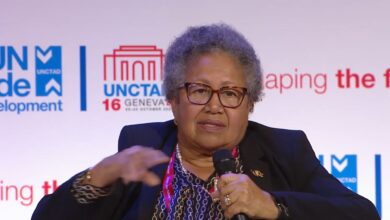(CARICOM Secretariat, Turkeyen, Greater Georgetown, Guyana) The issue of Invasive species and the need to diminish their threat to Caribbean agriculture and the environment will come under the microscope in the second annual Invasive Species Symposium which now forms an integral part of the annual Caribbean Food Crop Society (CFCS) meeting. The 44th annual CFCS meeting takes place in Miami 13-18 July 2008.
The symposium will be held under the theme The Role of the Caribbean Invasive Species Surveillance and Information Programme (CISSIP) in Regional Agriculture Repositioning Strategy.
Sponsored by the US Department of Agriculture programme for Tropical and Subtropical Agriculture Research, T-STAR, the symposium will feature presentations from experts on work being done to prevent and ameliorate the negative impact of invasive species in the Caribbean Region.
Topping the list of presentations will be a status update on efforts to secure multi-donor funding for the all encompassing CISSIP. Efforts to obtain funding for this all encompassing and holistic programme for invasive species in the wider Caribbean has not met with any significant measure of success with the international funding agencies despite its conformity to assistance framework.
This Programme spans the wider Caribbean, has individual components which can stand alone and commits the input and support from participating countries thus allowing for sustainability in the long run. Some of the components of the Programme include plant and animal invasive and importantly aspects of public education.
The CISSIP project is aimed at protecting the Caribbean Region from pests – a category of invasive species. It will also provide timely information on the status of pests and support pests risk assessment which are needed to facilitate trade. An internet based network of diagnostic laboratories and specialists will be established and utilised in the fight against invasive species. The CARICOM Secretariat and the Caribbean Agricultural Development Agency (CARDI) will be expected to assume significant administrative and technical oversight when funding is secured.
This focus on invasive species at the 44th annual Meeting of the CFCS comes on the heel of several initiatives taken in the Caribbean Community (CARICOM). This year at the inaugural meeting of the Caribbean Plant Health Directors, the subject was widely discussed and specific action was agreed to on the issue of diminishing the threat of plant pests to trade,
The Plant Health Directors agreed to set up a number of technical Working Groups of pest which should be of priority concern to the Region, and one of these – on the Giant African Snail (GAS) met in Barbados July 3-4 to address coordinated and coherent action to be taken by countries currently infested and by those aiming to prevent entry. The outcomes of that Meeting and future action taken with respect to the GAS will be reported to the next meeting of the Plant Health Directors. The meeting was organized by the USDA/APHIS and the CARICOM Secretariat. Other Organisation participating included the FAO, CARDI and the Cave Hill campus of the University of the West Indies (UWI). The GAS is present in several or the Caribbean countries.
Another such technical working group – the Red Palm Mite will meet within the margins of the CFCS forum. The work of the Red Palm Mite working group is of particular importance to the Caribbean since this pest and others that are emerging are having a devastating impact on palms including coconuts.





